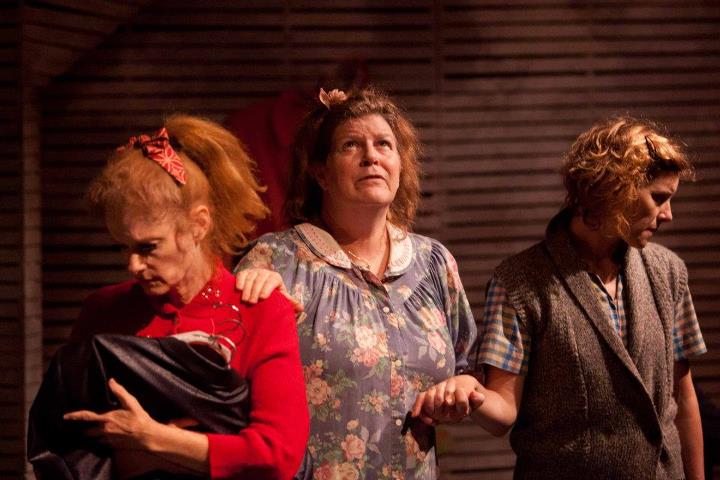What’s the best city for Irish plays?
Recently, it has been Los Angeles. First we had the Mark Taper Forum’s stellar production of Waiting for Godot, which stands as the finest version of the play in a decade. Now comes Rogue Machine Theatre’s nuanced and ferocious staging of Enda Walsh’s The New Electric Ballroom. Words have rarely gushed from actors’ mouth in such volume or intensity, nor are the spaces between the words usually so telling.
After walking through a warren of hallways, you come to the small stage: a cottage in some remote part of Ireland. It is hard to know what goes on outside the slatted walls of this place, although Ada (Betsy Zajko) seems to have a job in the village, and Patsy (Tim Cummings) pounds on the front door to deliver fish.
The outside world is vague because, to the dysfunctional inhabitants of these rooms, it does not matter much – it would upset the order of things. Ada lives here with her older sisters Breda (Lisa Pelikan) and Clara (Casey Kramer); they’re a generation older than Ada, which forces Ada into the role of caretaker, and invests Breda and Clara in the security of the status quo.
This security is by no means comfortable – the three sisters enact a ritualized existence, comprised of the commonplaces of life (eating, dressing) writ into giant and scary repetition compulsions. When the clear attraction between Ada and Patsy threatens to disrupt the abnormal normalcy of this household, each character must decide what she’s willing to risk.
Playwright Walsh, screenwriter of Hunger and recent Tony winner for Once, begins this play in the middle of its psychic action, and does not let up. The characters speak volumes of poetic, image-laden words that slowly, slowly reveal to the audience what’s going on. Half the tension on this play comes from unraveling the mystery of who these people are and what they’re doing; the other half comes from how much we come to hope they can break free and find happiness.
There’s more than an echo of Godot here. Some of the language directly alludes to Becket’s play (Clara even has riff on Lucky’s monologue), and the formal similarities are striking: four characters in one place as they try to puzzle the nature of their existence; the repetition of games to pass the time; the difference in understanding between Act One and Act Two – at the end of the first act of each play, there is hope, but at the end of the second, knowledge has broken hope’s skin. Deeper down, there are resonances of Dostoyevsky, especially in the naturalism of each character’s psychology.
Silence intones this psychology even more than words. Director John Perrin Flynn has given the actors beautiful moments of reaction and listening, actions unaccompanied by speech: Clara, sitting at the table hopeful for what might come next; Breda, plate in hand, like a bird unable to find her perch; Ada rapt in luminous adoration as Patsy talks. The cast works as a masterful ensemble, and their Irish dialects demonstrate these American actors’ perfect technique.
It’s not only easier than a trip to Dublin’s theatre district. It feels triumphant to find this world-class production here at home.
Image: Lisa Pelikan, Casey Kramer and Betsy Zajko in The New Electric Ballroom; photo by John Perrin Flynn.

